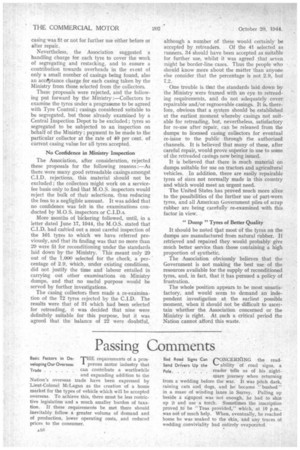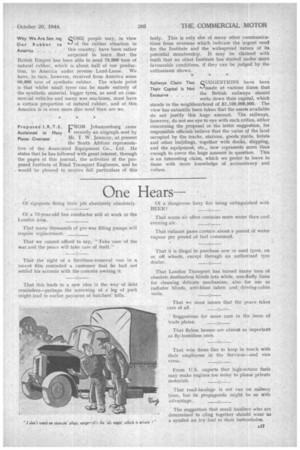Passing Comments
Page 18

Page 19

If you've noticed an error in this article please click here to report it so we can fix it.
Basic Factors in DeTHE requirements of a prosvelop i ng Our Overseas porous motor industry that Trade can contribute a worthwhile
and expanding addition to the Nation's overseas trade have been expressed by Lieut-Colonel McLagan as the creation of a home market for the types of vehicle which will be accepted overseas. To achieve this, there must be less restrictive legislation and a much smaller burden of taxation. If these requirements be met there should inevitably follow a greater volume of demand and of production, lower operating costs, and reduced prices to the consumer.
*10
Bad Road Signs Can cONCERNING the read
Send Drivers Up the ability of road signs, a Pole reader tells us of his night mare journey when returning from a wedding before the war. It was pitch dark, raining cats and dogs, and he became " bushed " in a maze of winding lanes in Surrey. Pulling up beside a signpost was not enough, he had to shin up it and use a torch. Sometimes the inscription proved to be "Teas provided," which, at 10 p.m., was not of much help. When, eventually, he reached home he was soaked to the skin, and any traces of wedding conviviality had entirely evaporated.
Why We Are Sen ing Q011e11.' people may, in view Our Rubber to of the rubber situation in
America this country, have been rather
surprised to learn that the British Empire has been able to send 78,000 tons of natural rubber, which is about half of our production, to America under reverse Lend-Lease. We have, in turn, however, received from America some 90,000 tons of synthetic rubber. The whole point is that whilst small tyres can be made entirely of the synthetic material, bigger tyres, as used on commercial vehicles and many war machines, must have a certain proportion of natural rubber, and of this America is in even more dire need than are we.
F"'Johannesburg came recently an airgraph sent by Mr. T. W. Jauncey, at present the South African representative of the Associated Equipment Co., Ltd. He states that he has followed with great interest, through the pages of this journal, the activities of the proposed Institute of Road Transport Engineers, and he would be pleased to receive full particulars of this
Proposed I.R.T.E. Acclaimed in Many Places Overseas .
body. This is only &le of many other communications from overseas which indicate the urgent need for the Institute and the widespread nature of its potential membership. It may be claimed with truth that no other Institute has started under more favourable conditions, if they can be judged by the enthusiasm shown.
SUGGESTIONS have been made at various times that the British railways should write down their capital, which stands in the neighbourhood of £1,100,000,000. The view has naturally been taken that the assets available do not justify this huge amount. The railways, however, do not see eye to eye with such critics, either Concerning the proposal or the latter suggestion, for responsible officials believe that the value of the land occupied by the tracks, stations, goods yards, hotels and other buildings, together with docks, shipping, and the equipment, etc., now represents more than enough to cover the huge amount in question. This is an interesting claim, which we prefer to leave to those with more knowledge of accountancy and values.
Railways Claim That Their Capital is Not Excessive




















































